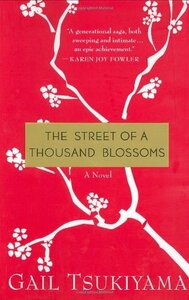You need to sign in or sign up before continuing.
Take a photo of a barcode or cover
challenging
emotional
informative
reflective
medium-paced
Plot or Character Driven:
A mix
Strong character development:
Yes
Loveable characters:
Yes
Diverse cast of characters:
Complicated
emotional
sad
slow-paced
Plot or Character Driven:
A mix
Strong character development:
Yes
Loveable characters:
Complicated
Diverse cast of characters:
Yes
Flaws of characters a main focus:
Yes
I wish I could give it 4.5 stars.
There are books that are so rich, so full of the essence of a place and its people, that they do not lend themselves to being merely "summarized" or "described." Books that do not follow merely one or two characters and their experiences, but truly try to examine a cross-section of humanity and how their lives intertwine. For me, this was such a book. And while the Japanese brothers Hiroshi and Kenji are at the crux of this amazing novel, we also come to know and love the people that surround them.
Hioschi and Kenji are orphaned very young and are raised just outside of Tokyo by their beloved grandparents. Their ojichan and obachan are such...exquisite people. Their values and patience, their love and strength seemed to epitomize all that is good in Japanese culture. And as these boys and their countrymen go through the hell that was World War II, we see a completely different side of that war's story than we usually read: the plight of the common Japanese citizen. The scars of the firestorms at the end of the war have far-reaching consequences and no characters escape being affected in one way or another.
What I think I really liked most about this book is that it completely immersed me in Japanese culture. The ancient theater customs, city life vs rural life, the traditional sport of sumo wrestling (which honestly, I never would've thought I'd be interested in), I found myself putting the book down sometimes to do more research. And all the Japanese language sprinkled throughout was easily understood in context and made the story an even richer experience. I think the only thing about this book that didn't thrill me is that it wasn't exactly a "happy" book. While good things happen to some of the characters, it's also a raw and realistic picture of life at the time, as well as of human nature and its most basic weaknesses. And while it jumped around from character to character a lot, I followed it with no problem, like finishing a conversation with one friend and then taking a call from another. A great piece of literature.
There are books that are so rich, so full of the essence of a place and its people, that they do not lend themselves to being merely "summarized" or "described." Books that do not follow merely one or two characters and their experiences, but truly try to examine a cross-section of humanity and how their lives intertwine. For me, this was such a book. And while the Japanese brothers Hiroshi and Kenji are at the crux of this amazing novel, we also come to know and love the people that surround them.
Hioschi and Kenji are orphaned very young and are raised just outside of Tokyo by their beloved grandparents. Their ojichan and obachan are such...exquisite people. Their values and patience, their love and strength seemed to epitomize all that is good in Japanese culture. And as these boys and their countrymen go through the hell that was World War II, we see a completely different side of that war's story than we usually read: the plight of the common Japanese citizen. The scars of the firestorms at the end of the war have far-reaching consequences and no characters escape being affected in one way or another.
What I think I really liked most about this book is that it completely immersed me in Japanese culture. The ancient theater customs, city life vs rural life, the traditional sport of sumo wrestling (which honestly, I never would've thought I'd be interested in), I found myself putting the book down sometimes to do more research. And all the Japanese language sprinkled throughout was easily understood in context and made the story an even richer experience. I think the only thing about this book that didn't thrill me is that it wasn't exactly a "happy" book. While good things happen to some of the characters, it's also a raw and realistic picture of life at the time, as well as of human nature and its most basic weaknesses. And while it jumped around from character to character a lot, I followed it with no problem, like finishing a conversation with one friend and then taking a call from another. A great piece of literature.
I love this book, love the author. Reads like poetry, makes me want to read outside.
This is a good story, but not a page turner. Definitely a safe bedtime read.
I don't normally write reviews but for this book I feel like I need to explain my rating, because I was torn on what to put. While I enjoyed reading this book for many reasons (interesting characters and setting, good writing, learning more about other cultures) I also felt that the author overdid the tragedy aspects. By the end it didn't feel tragic anymore because I knew from the pattern that something bad was going to happen. It felt more sadistic than realistic, like the author was thinking, what other bad things can I do to these characters? rather than thinking about furthering the plot, themes, character development, etc. Overall though I think the other positive aspects of the book outweigh this flaw.
Spoiler
Particularly at the end, I felt like the fact that Mika's death, coming on top of everything else, was so gratuitous that it made Aki's suicide feel less powerful. It was more just a feeling of well, of course the author would do that, rather than thinking about Aki's reasons as a person/character.
Another enjoyable book by Gail Tsukiyama. Her portrayal of Japan during WWII gave me an insight into what the Japanese people went through during that period - much more suffering than I ever realized. Her descriptions of Sumo and the rituals surrounding it gave me a better appreciation of the sport. Her characters had enough depth that you could form opinions about them. My only complaint is that I felt she repeated herself at times and the story seemed to drag on a bit. I often wondered where it was going to end. She did wrap things up satisfactorily though.
Just didn't like this one as well as The Samurai's Garden, although the ending was a little less of a let-down. It was involving enough, just so sad at parts it was hard to develop any affection for the story.
A nice story with good characters, but sadly it never really went anywhere. Things just happen to the characters with little or no sense of a larger purpose or point to the story. The writing is good and made it easier to read, but it would have been so much better with a better organized plot.
Melodrama for the sake of melodrama- it gets 3 stars because the writing is fantastic, the pace and characters are wonderful, it just took me out of the story when (spoiler!) friggin everyone dies the most random death. Like, it happens, plenty of the book is very real, and some people/families really do have that much bad luck- but it just feels forced in a fictional story when bad things just happen out of the blue. One or two things, sure, but I can think of at least 4 unforeseeable tragedies right away- and by the third and fourth I’m not into the story anymore, I’m thinking more of the writing process and the decision making by the author. The first half of the book is amazing, and the melancholy works brilliantly within the context of WW2- it just shouldn’t continue so much in the second half, or if it were to continue it’d seem better should the tragedies be a bit less “deus ex machina” or whatever. Still- if emotional turmoil is your thing then this book is for you, I just found some of the tragic turns a bit forced, personally.


